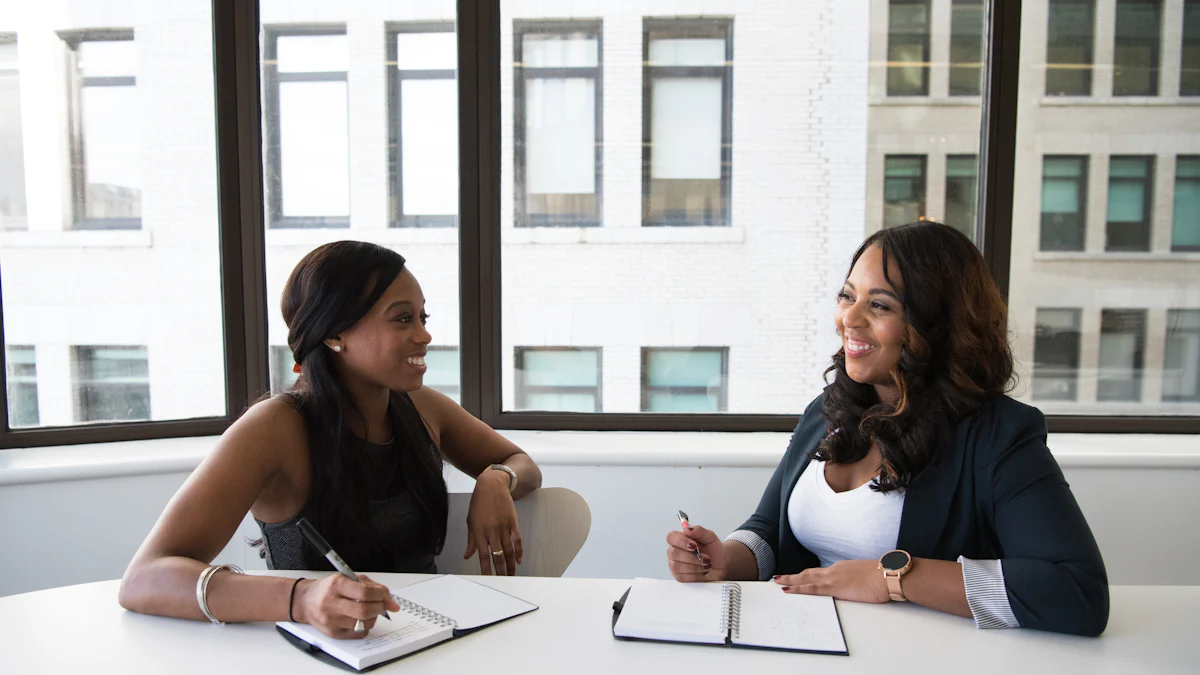Top 10 Good Questions to Ask at the End of an Interview
Try Aihirely for
Smarter Interview Prep
Experience real-time AI support tailored to your Resume.
Boost your confidence and ace every question with
AI Mock Interview.

Image Source: pexels
You know that moment at the end of an interview when they ask, “Do you have any questions for us?” That’s your chance to shine. Asking good questions to ask at the end of an interview shows you’re prepared and genuinely interested. Plus, it helps you figure out if the job is right for you.
Key Takeaways
-
Asking about success in the job shows you care about doing well and helps match your skills to the company’s needs.
-
Ask about the first tasks for the job to know what problems you might face and how to get ready.
-
Learning the company’s goals and values helps you see if they match yours, making sure it works well for both sides.
Good Questions to Ask About the Role
What does success look like in this role?
This is a great way to understand what the company values most. When you ask this, you’re showing that you care about meeting expectations and delivering results. The answer can also help you figure out if your skills and strengths align with what they’re looking for. For example, if success means hitting specific sales targets or leading a team effectively, you’ll know exactly where to focus your efforts.
What are the immediate priorities for this position in the first 90 days?
This question shows that you’re already thinking about how to hit the ground running. It also gives you a clear picture of what the company needs right now. Maybe they’re looking for someone to solve a pressing problem or launch a new project. Knowing this upfront helps you decide if you’re ready to take on the challenge.
How has this position evolved over time?
Asking this question can reveal a lot about the role’s potential for growth. It also shows that you’re curious about the bigger picture. Has the role expanded to include more responsibilities? Or has it shifted to meet changing business needs? This can give you insight into how adaptable the company is and whether they invest in their employees’ development.
What are the key challenges associated with this role?
Every job has its challenges, and it’s better to know them upfront. When you ask this, you’re showing that you’re not afraid of tackling tough situations. Plus, it gives you a chance to highlight your problem-solving skills. Companies value candidates who can think creatively and adapt to challenges, so this question can leave a strong impression.
Tip: Hiring managers often look for qualities like adaptability, communication skills, and a strong work ethic when candidates ask about the role. Use your questions to subtly showcase these traits.
By asking these good questions to ask at the end of an interview, you’re not just gathering information—you’re also showing that you’re proactive, thoughtful, and ready to contribute.
Good Questions to Ask About the Company
How would you describe the company’s mission and values in practice?
Understanding a company’s mission and values is essential, but actions speak louder than words. Ask this question to learn how the company lives its values daily. For example, do they prioritize sustainability by reducing waste or giving back to the community? This insight helps you see if their principles align with yours. Plus, it shows you care about more than just the paycheck.
What are the company’s goals for the next year, and how does this role contribute to achieving them?
This question highlights your interest in the bigger picture. It also helps you understand how your role fits into the company’s plans. For instance, if you’re applying for a sales role, the company might aim to increase revenue by 15%. Your goal could involve boosting sales by 10% through targeted outreach. Here’s a quick example of how roles align with company goals:
| Department | Organization Goal | Team Goal | Well-Aligned Individual Goal |
|---|---|---|---|
| Sales and Marketing | Increase annual revenue by 15% | Launch 3 new marketing campaigns within the next quarter | Increase sales revenue by 10% within the next 6 months through targeted customer outreach |
This alignment ensures you’ll contribute meaningfully to the company’s success.
Can you share more about the company’s culture and work environment?
Culture matters. Ask this to get a feel for the day-to-day vibe. Look for signs of a positive culture, like professional onboarding processes or work-life balance initiatives. You can also ask about team dynamics or how employees collaborate. These details help you decide if you’ll thrive in their environment.
What qualities does the company look for in a successful candidate?
This question shows you’re eager to meet expectations. It also gives you a chance to highlight your strengths. If they value adaptability or teamwork, you can share examples from your experience. Plus, it helps you understand what it takes to succeed in their eyes.
Tip: Asking good questions to ask at the end of an interview, like these, shows you’re thoughtful and invested in the opportunity.
Good Questions to Ask About Team Dynamics

Image Source: pexels
Can you tell me more about the team I’d be working with?
This question helps you understand the people you’ll interact with daily. It’s a chance to learn about their roles, personalities, and how they contribute to the team’s success. You might discover if the team is diverse, experienced, or close-knit. Knowing this can help you picture yourself in the role and decide if the team dynamic suits you. Plus, it shows you’re already thinking about how you’ll fit in and collaborate effectively.
How does the team typically collaborate on projects or solve problems?
Teamwork is key in most workplaces, so it’s smart to ask how the team works together. Do they prefer brainstorming sessions, or do they rely on digital tools like Slack or Trello? Strong collaboration often leads to better problem-solving. Teams that combine their knowledge can find solutions faster. They also create opportunities for members to learn from each other. A positive team environment can boost productivity and make work more enjoyable. Asking this shows you value teamwork and want to contribute to a productive group.
What is the management style and leadership approach within the team?
Leadership can make or break your experience in a role. By asking about management style, you’ll get a sense of how the team is guided. Does the manager take a hands-on approach, or do they give employees more independence? Clear communication and defined roles are often signs of effective leadership. A supportive leader fosters collaboration and resilience, which can make a big difference in your day-to-day work. This question also shows you’re thinking about how you’ll thrive under their guidance.
Tip: Asking good questions to ask at the end of an interview, like these, shows you’re not just interested in the job but also in building strong relationships with your future team.
Good Questions to Ask About Career Growth

Image Source: pexels
What opportunities for professional development does the company offer?
If you’re looking to grow in your career, this is a must-ask question. Companies often provide professional development opportunities to help employees sharpen their skills and stay motivated. These might include online learning platforms, paid seminars, or even employer-sponsored schooling. Not only do these programs help you expand your expertise, but they also boost job satisfaction. In fact, studies show that 68% of employees would stay with their company if they had access to more learning opportunities. Asking this question shows you’re serious about growing and contributing to the company’s success.
How do you typically support employees in achieving their career goals?
This question helps you understand how the company invests in its people. Do they offer mentorship programs or regular performance reviews? Maybe they encourage employees to set personal goals and provide resources to achieve them. By asking this, you’ll get a sense of whether the company values long-term growth. Plus, it shows you’re thinking ahead and want to align your career path with the company’s vision. It’s a win-win for both you and the employer.
Are there opportunities for training and progression within the company?
Training and progression are key to building a fulfilling career. When you ask this, you’re showing that you’re eager to learn and take on new challenges. Some companies offer certifications, tuition reimbursement, or leadership training programs. These opportunities not only enhance your skills but also open doors to promotions and new roles. A company that prioritizes employee growth often has higher morale and retention rates. This question can help you decide if the company is the right place for your long-term goals.
Tip: Asking good questions to ask at the end of an interview, like these, shows you’re not just thinking about the present but also planning for your future.
Good Questions to End on a Positive Note
Is there anything about my background or experience that gives you pause?
This question shows you’re open to feedback and eager to improve. It also gives you a chance to address any concerns the interviewer might have before the process moves forward. For example, if they mention a skill you’re less experienced in, you can highlight how you’re actively working to develop it. This approach demonstrates your adaptability and willingness to grow. Employers value candidates who are proactive and flexible. As one employee once shared, “Your adaptability and flexibility in learning and applying new techniques made the transition smoother for the entire team.” Asking this question can leave a lasting impression of your professionalism and self-awareness.
What are the next steps in the hiring process?
This is a practical yet essential question. It shows you’re serious about the role and want to stay informed. The answer will help you understand the timeline and what to expect next. For instance, they might outline additional interviews, reference checks, or a final decision date. Knowing this keeps you prepared and reduces uncertainty. Plus, it subtly communicates your enthusiasm for the opportunity. Employers appreciate candidates who are organized and proactive, and this question reflects those qualities.
What do you enjoy most about working at this company?
This question shifts the focus to the interviewer, creating a more personal connection. It also gives you insight into the company’s culture and values from someone who experiences them daily. You might hear responses like, “I’m glad that you participated in this challenge. Not only will it benefit you, but your participation will also make this company better.” Or, “We appreciate your evident flexibility to accommodate the team’s needs.” These answers can reveal what makes the workplace special and whether it aligns with what you’re looking for. Asking this question shows you’re genuinely interested in the people and environment, not just the job itself.
Tip: Ending with thoughtful, positive questions like these leaves a strong final impression. It shows you’re engaged, curious, and ready to contribute.
Asking good questions to ask at the end of an interview helps you stand out and gather valuable insights. Tailoring your questions to the role, company, and interviewer shows you’re prepared and invested. It also ensures you focus on what matters most. Remember, interviews are your chance to evaluate the company too.
FAQ
What if I can’t think of any questions to ask at the end of the interview?
Don’t worry! Prepare a few questions in advance. Focus on topics like the role, company culture, or team dynamics. This shows you’re thoughtful and prepared.
Can I ask about salary or benefits during the interview?
It’s better to wait until the employer brings it up or during later stages of the process. Focus on understanding the role and company first to leave a positive impression.
How many questions should I ask at the end of an interview?
Aim for 2-3 thoughtful questions. This keeps the conversation engaging without overwhelming the interviewer. Prioritize questions that genuinely interest you or help you evaluate the opportunity.
